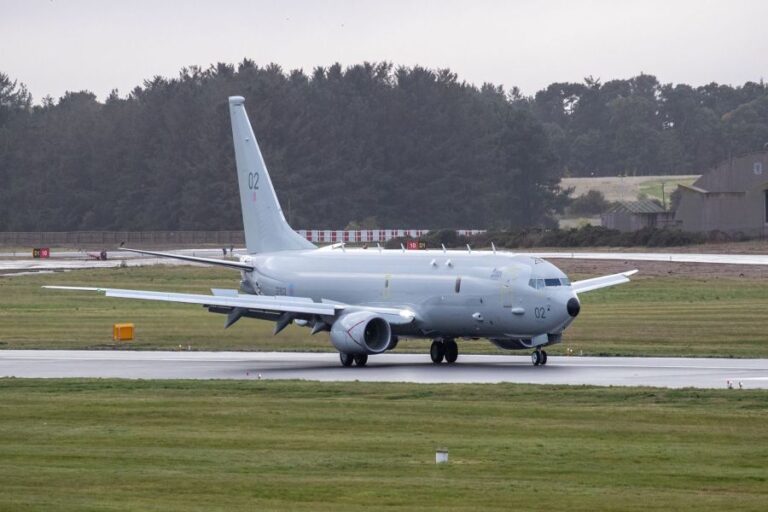In a significant step toward enhancing European defense, the United Kingdom and Germany are set to sign a new defense pact aimed at countering growing threats from Russia. This “landmark” agreement will see German submarine-hunting planes operate off the Scottish coast and marks deeper collaboration between the two nations across air, land, and sea defenses.
As part of the pact, German P8-Poseidon maritime patrol aircraft, designed to track and neutralize submarines, will operate periodically from a Royal Air Force base at Lossiemouth, Scotland. These missions, set to begin as early as next year, are aimed at bolstering surveillance in the North Atlantic, a key strategic area for both nations.
German Defense Minister Boris Pistorius emphasized the importance of these operations, stating, “The U.K. and Germany are moving closer together. With projects across air, land, sea, and cyber domains, we will jointly increase our defense capabilities, thereby strengthening the European pillar within NATO.”
The planned fleet of P8-Poseidons, developed by Boeing, is expected to be fully operational by 2025, with potential upgrades to include British-made torpedoes.
Beyond submarine tracking, the agreement highlights the necessity of protecting critical undersea infrastructure such as cables and pipelines. In light of recent hybrid attacks targeting vital energy supplies and communications networks, the UK and Germany will collaborate on advanced undersea surveillance capabilities, reflecting their commitment to safeguard these essential assets.
One of the most notable elements of the defense pact is the establishment of a new artillery gun barrel factory in the UK. German defense giant Rheinmetall will lead the project, creating more than 400 jobs and revitalizing domestic weapons production. The new facility will be the first of its kind in Britain in over a decade, addressing critical gaps in the UK’s artillery production capabilities, which were exposed by recent conflicts, including Russia’s invasion of Ukraine.
The UK and Germany’s agreement also underscores a joint commitment to reinforcing NATO’s presence in Eastern Europe, particularly in Estonia and Lithuania. Troops from both countries, who are stationed in these areas, will now conduct joint exercises and operations to enhance readiness and deter potential threats.
The cooperation will also extend to the development of long-range strike weapons. Both countries have prioritized the creation of missiles capable of hitting targets at greater distances and with more precision than the current UK-French Storm Shadow missiles. This expansion in military technology aims to close critical gaps in NATO’s defense strategies.
The agreement dubbed the Trinity House Agreement, is expected to be signed by UK Defence Secretary John Healey and German Defense Minister Boris Pistorius on Wednesday. Mr. Healey hailed the pact as a “milestone” moment, highlighting that it would enhance shared security and prosperity while boosting the defense capabilities of both nations.
“It secures unprecedented levels of new cooperation with the German Armed Forces and industry, bringing benefits to our shared security and prosperity, protecting our shared values, and boosting our defense industrial bases,” Healey said.
The Ministry of Defence noted that both the UK and Germany are Europe’s top defense spenders, especially in response to the security challenges posed by Russia. The agreement marks a significant step in fortifying defense cooperation, which has traditionally been more prominent between the UK and France, another nuclear power with a long history of military engagement.
Germany’s defense spending has ramped up following the Russian invasion of Ukraine, mirroring similar increases across Europe. Both nations have pledged to maintain a strong European defense presence within NATO, particularly as tensions remain high with Russia. “We must not take security in Europe for granted,” Pistorius said, underscoring the necessity of the new pact.
Pistorius emphasized the significance of this agreement as a symbol of solidarity, particularly as Europe faces new security challenges. “With projects across air, land, sea, and cyber domains, we will jointly increase our defense capabilities, thereby strengthening the European pillar within NATO,” he said. “We must not take security in Europe for granted.”
The Trinity House Agreement is set to be the first pillar of a broader UK-Germany treaty pledged by Prime Minister Keir Starmer and Chancellor Olaf Scholz in August. As cooperation deepens, both nations are expected to explore additional areas of military development, including new drone technologies for land and air operations.

